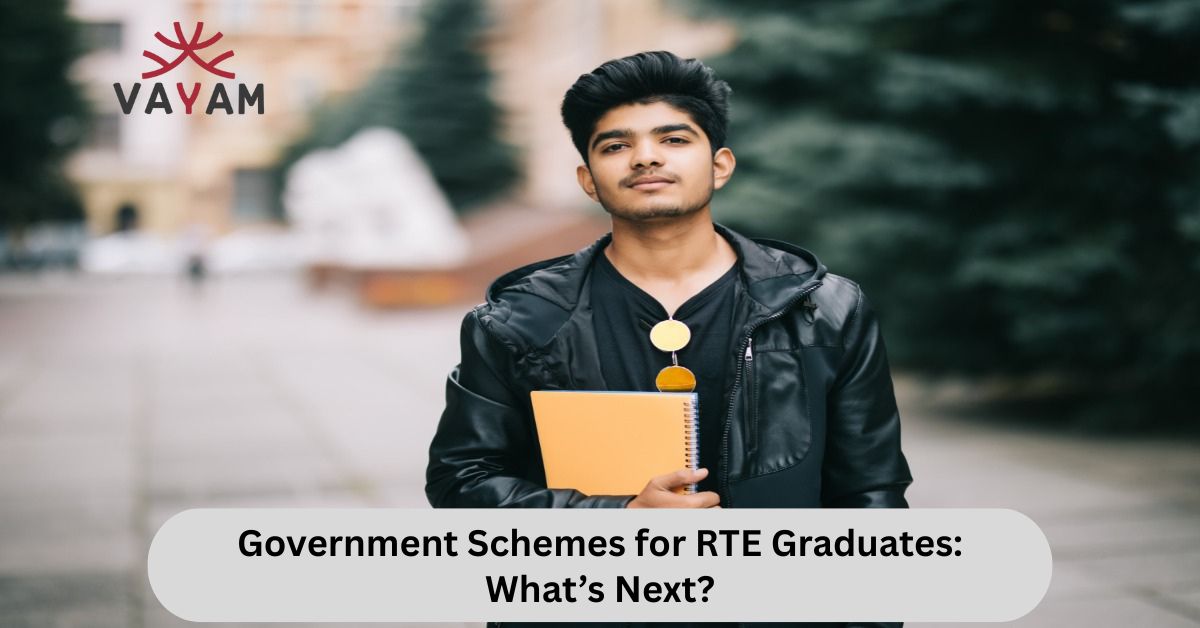
The Right to Education (RTE) Act, enacted in 2009, marked a significant milestone in India’s educational landscape. By ensuring free and compulsory education for children aged 6 to 14, the act aimed to empower the youth and pave the way for a brighter future. As a result, a new generation of RTE graduates is emerging, poised to enter the workforce. But what does the future hold for these graduates? This blog explores the government schemes available for RTE graduates and outlines potential paths for their future.
Understanding RTE Graduates
What is RTE?
The Right to Education (RTE) Act is a legislative framework that guarantees free and quality education for children. It mandates that all children from economically weaker sections have access to primary education in a safe environment, fostering holistic development.
Profile of RTE Graduates
Graduates typically come from diverse backgrounds, often hailing from underprivileged communities. They possess basic educational qualifications but may lack access to advanced educational resources or vocational training. Understanding their unique profile is crucial for tailoring government schemes to meet their needs effectively.

Current Government Schemes for RTE Graduates
Skill Development Programs
The Indian government has initiated several skill development programs aimed at enhancing the employability of RTE graduates.
- PMKVY (Pradhan Mantri Kaushal Vikas Yojana): This scheme focuses on providing skill training to youth. It offers short-term and long-term courses in various sectors, enabling RTE graduates to gain practical skills tailored to market demands.
- National Skill Development Mission: This initiative aims to create a skilled workforce by providing financial assistance for vocational training and promoting public-private partnerships in skill development.
Financial Assistance Schemes
Financial support is crucial for many graduates who wish to pursue further education or vocational training.
- Scholarship Schemes: Various state and central scholarships are available for RTE graduates, assisting them in pursuing higher education. Examples include the Post Matric Scholarship for SC/ST students and the Minority Scholarship Scheme.
- Educational Loans: The government provides educational loans with lower interest rates and flexible repayment options, making it easier for students to finance their education.
Employment Generation Schemes
To address unemployment among graduates, the government has launched several employment-centric schemes.
- Mahatma Gandhi National Rural Employment Guarantee Act (MGNREGA): This program ensures that rural households receive at least 100 days of wage employment in a financial year, providing an immediate source of income.
- Startup India: This initiative encourages young entrepreneurs by providing funding, mentorship, and business incubation support. RTE graduates can leverage this to start their own ventures.

Challenges Faced by RTE Graduates
Despite the availability of government schemes, RTE graduates face several challenges:
- Lack of Awareness: Many graduates are unaware of the schemes available to them, limiting their ability to access these resources.
- Skill Gap: While skill development programs exist, there is often a mismatch between the skills taught and the skills demanded by the job market.
- Socioeconomic Barriers: Graduates from underprivileged backgrounds may face additional challenges, such as financial instability and familial obligations, hindering their ability to pursue education or employment.
Future Opportunities and What’s Next
Higher Education Options
RTE graduates have numerous pathways for higher education:
- Vocational Training: Many institutions offer vocational courses that equip graduates with specific skills needed in the job market.
- University Education: Graduates can apply for undergraduate programs in various fields, supported by scholarships and educational loans.
Entrepreneurship
With the rise of the startup culture in India, entrepreneurship presents a viable option for graduates.
- Business Incubators: Government-supported business incubators can provide RTE graduates with the necessary mentorship and resources to launch their own startups.
- Skill Development for Entrepreneurs: Training programs specifically designed for aspiring entrepreneurs can help graduates acquire the skills needed to succeed in business.

Continued Government Support
The government’s commitment to the education and employment of RTE graduates is crucial for their success.
- Policy Revisions: Continuous assessment and revision of existing policies can help align the schemes with the changing needs of the workforce.
- Public-Private Partnerships: Collaborations between the government and private sector can enhance the effectiveness of skill development programs and employment generation initiatives.
Conclusion
The future for RTE graduates is filled with potential, but realizing this potential requires a concerted effort from both the government and society. By leveraging existing government schemes and exploring new opportunities, RTE graduates can carve a successful path for themselves. The road ahead may be challenging, but with adequate support and resources, these individuals can overcome obstacles and contribute meaningfully to society.
Read More
How RTE Act Impacts Private Schools in India?
RTE Admission for EWS Category: Everything You Need to Know
Private Schools vs RTE Schools: Which is Better for Kids?
FAQs
1. What are the main government schemes for RTE graduates?
The main schemes include skill development programs like PMKVY, financial assistance through scholarships and educational loans, and employment generation programs like MGNREGA.
2. How can RTE graduates access scholarships?
RTE graduates can find scholarships through state education departments or through online portals dedicated to scholarship information.
3. Are there specific vocational training programs for RTE graduates?
Yes, several government and private institutions offer vocational training programs tailored to the skills needed in various industries.
4. What support is available for aspiring entrepreneurs among RTE graduates?
Aspiring entrepreneurs can access business incubators, mentorship programs, and funding through initiatives like Startup India.
5. How can the government improve support for RTE graduates?
The government can improve support by enhancing awareness of existing schemes, updating skill training programs to match market needs, and fostering public-private partnerships.
